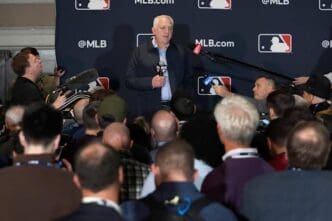Major League Baseball recently conducted an investigation to confirm that no advance deals had been secured for Japanese pitcher Roki Sasaki, aiming to maintain a fair signing process.
On the commencement of Sasaki’s 45-day window to sign with a Major League team, his agent, Joel Wolfe, stated that the 23-year-old is expected to select a club shortly after the opening of the 2025 international signing pool window on January 15, foregoing the final deadline of January 23.
The primary motivation for an early decision lies in the timely initiation of the visa process, enabling Sasaki to participate in spring training. Wolfe emphasized during a media session at the MLB winter meetings in Dallas that signing as soon as possible was advantageous.
Roki Sasaki, notable for his contribution to Japan’s victory in the 2023 World Baseball Classic and a fastball reaching 102.5 mph, has played four injury-shortened seasons with the Chiba Lotte Marines. His record includes a 29-15 win-loss and a 2.10 ERA, making him a promising prospect subject to signing bonus pools allocated to international amateurs under 25. This standing usually applies to 16-year-old Latin American prospects.
The Los Angeles Dodgers have reserved $2,502,500 in their 2024 bonus pool, leading to speculation about a pre-arranged agreement with Sasaki. However, Wolfe clarified that extensive discussions and investigations by MLB ensured no such advance deals existed, preserving an equitable playing field for all teams.
MLB prefers Sasaki’s signing to proceed into the 2025 period, with available team amounts ranging between $7,555,500 and $5,146,200. Wolfe advised Sasaki against making decisions based solely on immediate financial gains, highlighting the importance of a long-term career perspective.
Sasaki’s recent performances were hindered by shoulder inflammation and an oblique injury, yet he managed a perfect game in April 2022. Wolfe conveyed that Sasaki’s experience in international competitions influenced his decision to advance to MLB sooner rather than waiting for potentially larger contracts akin to those of his peers.
Sasaki, who lost his father and grandparents in the 2011 Tohoku earthquake and tsunami, plans to select his MLB team by considering factors beyond financial incentives, acknowledging the impermanence of life and the uncertainties of a sports career. His somber experiences have shaped his urgency to transition to MLB.
Furthermore, Wolfe noted Sasaki’s challenges with Japanese media due to his early interest in MLB, which some perceive as disrespectful. Despite negative media portrayals, Sasaki remains focused on his goal.
Some MLB teams have already initiated presentations to attract Sasaki, though specific destination preferences remain uncertain. Wolfe speculated Sasaki might favor teams with historical ties to Japanese players, such as San Diego, or smaller markets given past media challenges.
Sasaki is expected to adjust to pitching schedules in MLB, traditionally less frequent than in Japan, and Wolfe underscored the need for a gradual transition to ensure Sasaki’s long-term success and adaptation.
Roki Sasaki’s impending decision to join a Major League team reflects a calculated move influenced by personal experiences and career aspirations. MLB’s meticulous approach to ensuring a fair signing process underscores the significance of this transition, marking a pivotal moment in Sasaki’s promising career.
Source: Local10








